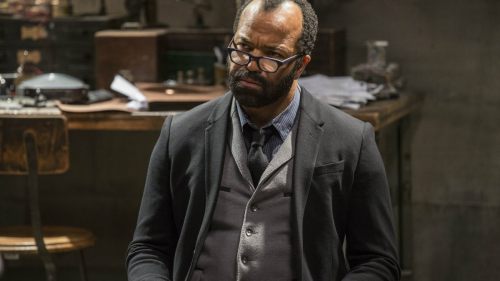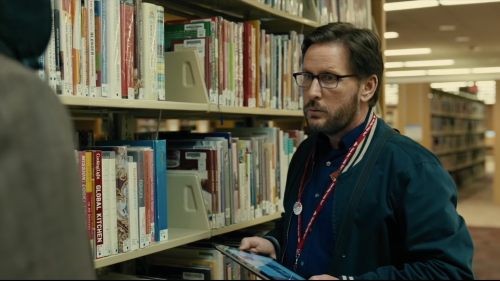Jeffrey Wright Talks HOLD THE DARK, Loving The Cold And Felix Leiter’s Future
Hold the Dark, launching on Netflix and in select theaters on Friday, is the most expansive film yet from Jeremy Saulnier, one of our foremost dark poets of violence and survival (Blue Ruin, Green Room). Set in the ominously picturesque wilds of Alaska, it is also an intimate study of damaged lives and fractured psyches, and at its center is a quietly gripping performance by Jeffrey Wright. He plays Russell Core, a wolf expert who is summoned to a middle-of-frozen-nowhere town to hunt down a lupine killer of children, and finds himself immersed in human evil.
Wright was unfamiliar with Saulnier’s work when Hold the Dark first came his way, but was taken with the script by the director’s regular collaborator Macon Blair, based on William Giraldi’s novel. “It was beautiful in its - at times - grotesqueness, but it was also wonderfully descriptive and lyrical and taut. Then I checked out Blue Ruin, and I loved that it took place amidst the lawlessness of rural Virginia, where I spent half my childhood. Jeremy captured a world in which the laws of natural man come into play, and given the expanse and absolute isolation described in Macon’s screenplay for Hold the Dark, I thought he could take those ideas and blow them out into the great, blindingly white Alaskan wilderness in a way that would be even more epic and intense. That sense of existing behind the back of civilization was so clear in the script.
“I was also excited because Jeremy has a very specific eye, and a compelling compositional sense. I love the way he uses inserts, for example, and the idea that he uses the camera in a way that the human eye wouldn’t necessarily behave.”
Wright wasn’t put off by the idea of taking Core’s journey through a frigid, forbidding environment (shot in Alberta, Canada); in fact, he welcomed it. “I grew up loving the mountains and skiing, so I’m not bothered by the cold,” he says. “It wasn’t so uncomfortable, because we were all thoroughly, thermally layered up. Actually, between my caribou boots and the caribou coat, I was sweating at times. And in fact, we were inviting of the bitterness and the sideways, driving snow. We wanted to see the steam vapors from people’s mouths, the ice crystallizing in my beard, the ruddiness in the cheeks and all of that, because it helped us tell the story. Nature and its laws are primary characters in this film. We were actually pissed when it started to warm up [laughs], when the Chinook winds came through, and we’d find that the four feet of snow we were working in the day before had melted to a foot and a half.”
The environment isn’t the only hostile thing Core faces when he heads into the northern territory. The people he encounters there—Medora Slone (Riley Keough), the traumatized mother of one of the wolves’ young victims; her husband Vernon (Alexander Skarsgård), an Iraq War soldier who returns home but doesn’t stop killing; and Vernon’s resentful Yup’ik friend Cheeon (Julian Black Antelope)—seem to have had portions of their humanity frozen out of them. Core, while more compassionate, is clearly suffering emotional wounds as well.
“He’s an ordinary, somewhat broken man who finds himself required to take on extraordinary things,” Wright notes, “and is completely unprepared for them, for the most part. I loved the idea of him unwittingly stumbling toward and through these things. Even though he looks like a bad-ass trudging through the snow, he knows how to handle a weapon, he’s comfortable in extreme natural settings and is capable of doing what is necessary to survive them, he’s still an Everyman. The journey that he takes, he takes in relation to his having retreated on a personal level from society. In some ways, it may be that he, like a sick animal might do, heads off into the wilderness to find his end, but along the journey, he discovers redemption. There’s symbolism and mythology woven throughout the story that I think is approachable for an audience, and that approachability is through Core.”
Core’s audience-surrogate status is key to Hold the Dark’s most blistering sequence, a lengthy gun massacre that the character is not part of in Giraldi’s novel. His involvement with the screen setpiece gives the viewer a solid point of identification, even though, as Wright recalls, “I largely watched it from the underside of an SUV! [Laughs] Filming that was great fun, a bit of boys being boys—except for the moment when I accidentally shot a Steadicam operator in the foot with a shotgun. It was just an air blast, but a pretty intense air blast, and I had to apologize to him for that!
“Core sort of stumbles into that scene,” Wright continues. “He’s snooping around, discovering things that he doesn’t want to discover, and he literally trips his way into hellfire. Again, I think this idea of the underdog, largely unprepared yet somewhat heroic figure is a powerful one, particularly when so many of our portrayals of heroism in film today involve superhumanness and outsized capacities and skills. That’s fun, but I think the idea of a kind of epic journey taken by one of us is even more compelling on many levels.”
Not that the actor is opposed to taking part in outsized heroics; after all, he played Felix Leiter in the James Bond adventures Casino Royale and Quantum of Solace, and was absolutely bad-ass doing it. (I’m sure I’m not the only one who would love to see Wright’s Leiter get his own movie.) “I was, like so many of us growing up, a huge James Bond fan,” he acknowledges. “But I was particularly a Felix Leiter fan, because my first experience with Felix was Jack Lord [in Dr. No], and I thought Jack Lord was one of the coolest customers outside of Muhammad Ali and Miles Davis. Back then, Jack Lord was a bad-ass! I would love to revisit Felix once more, and lay him, for me, to bed.”
Now that Cary Joji Fukunaga has been confirmed as director of the 25th 007 film, is that desire close to becoming a reality? “They like to keep these things close to the vest,” Wright replies. “I’m really pleased to see that it’s back on track, and [smiles] they’re aware of the secret, confidential phone line that’s required to reach Felix. So they may or may not have used that to this point, and we’ll see what happens going forward.”



